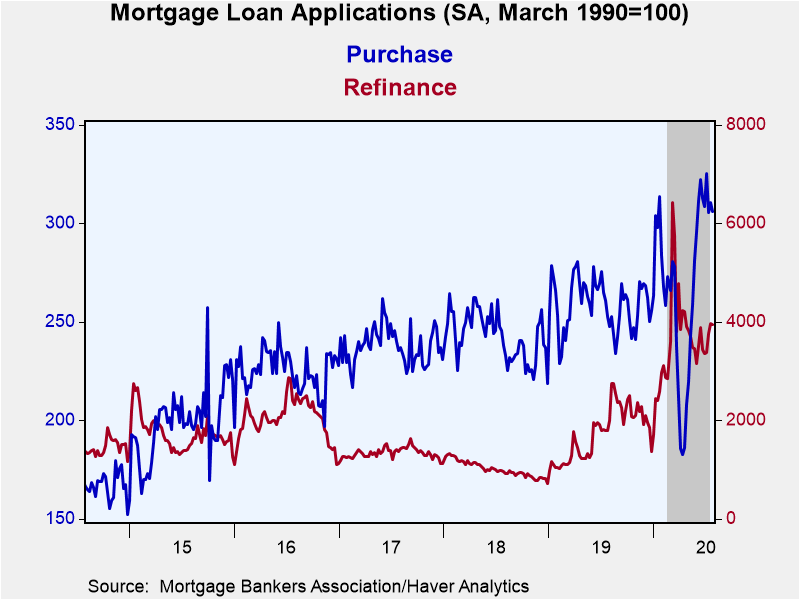 Global| Jul 29 2020
Global| Jul 29 2020Despite Near-Record Low Interest Rates, U.S. Mortgage Loan Applications Down 28% from Early March High
Summary
• Mortgage applications decreased 0.8% in week ending July 24. • Purchase applications off 5.9% from early June, refinance applications down 38.4% from early March. • 15-year fixed rate mortgage increase to 2.85%, near record low of [...]
• Mortgage applications decreased 0.8% in week ending July 24.
• Purchase applications off 5.9% from early June, refinance applications down 38.4% from early March.
• 15-year fixed rate mortgage increase to 2.85%, near record low of 2.78% set two weeks ago.
The Mortgage Bankers Association reported that its total Mortgage Applications Index declined 0.8% (+73.9% year-on-year) during the week ending July 24. Applications to purchase a home decreased 1.5% (+21.0% y/y), while refinance activity was down 0.4% (+120.9% y/y). After spiking to an 11-year high early March as interest rates dropped, mortgage applications fell in the second half of March and have been range-bound since. Total applications down are 28.2% from the March peak; refinancing has fallen 38.4%, while purchase is down 5.9% from its early-June 11-year high.
The effective interest rate on a 15-year fixed-rate mortgage increased to 2.85%; it reached a record low of 2.78% in the week ending July 10. While Treasury rates have been range-bound since early April, mortgage rates have been on the decline as risk premia -- the compensation for lending in riskier markets -- have fallen. Thirty-year fixed rates ticked up to 3.31% just two basis points from their record low of 3.31% to weeks ago. Thirty-year jumbo rates rose one basis point above the record low 3.59% set last week. Five-year adjustable rates increased to 3.12% from the four-year low of 2.94% last week.
The average mortgage loan size increased to $333,000 (4.8% y/y), down meaningfully from the early-March high of $367,900. For purchases the average loan size grew to $364,600 (13.2% y/y) while refinancing loans rose to $316,100 (0.8% y/y).
With fixed mortgage interest rates falling substantially more than adjustable rates, applications for fixed-rate loans are up 76.6% y/y versus 19.5% y/y for adjustable rate mortgages.
The survey covers over 75% of all U.S. retail residential mortgage applications and has been conducted weekly since 1990. Respondents include mortgage bankers, commercial banks and thrifts. The base period and value for all indexes is March 16, 1990=100. The figures for weekly mortgage applications and interest rates are available in Haver's SURVEYW database.
| MBA Mortgage Applications (%, SA) | 07/24/20 | 07/17/20 | 07/10/20 | Y/Y | 2019 | 2018 | 2017 |
|---|---|---|---|---|---|---|---|
| Total Market Index | -0.8 | 4.1 | 5.1 | 73.9 | 32.4 | -10.4 | -17.8 |
| Purchase | -1.5 | 1.8 | -6.1 | 21.0 | 6.6 | 2.1 | 5.6 |
| Refinancing | -0.4 | 5.3 | 11.9 | 120.9 | 71.1 | -24.3 | -34.0 |
| 15-Year Effective Mortgage Interest Rate (%) | 2.85 | 2.80 | 2.78 |
3.54 |
3.71 | 4.35 | 3.59 |
Gerald D. Cohen
AuthorMore in Author Profile »Gerald Cohen provides strategic vision and leadership of the translational economic research and policy initiatives at the Kenan Institute of Private Enterprise.
He has worked in both the public and private sectors focusing on the intersection between financial markets and economic fundamentals. He was a Senior Economist at Haver Analytics from January 2019 to February 2021. During the Obama Administration Gerald was Deputy Assistant Secretary for Macroeconomic Analysis at the U.S. Department of Treasury where he helped formulate and evaluate the impact of policy proposals on the U.S. economy. Prior to Treasury, he co-managed a global macro fund at Ziff Brothers Investments.
Gerald holds a bachelor’s of science from the Massachusetts Institute of Technology and a Ph.D. in Economics from Harvard University and is a contributing author to 30-Second Money as well as a co-author of Political Cycles and the Macroeconomy.









